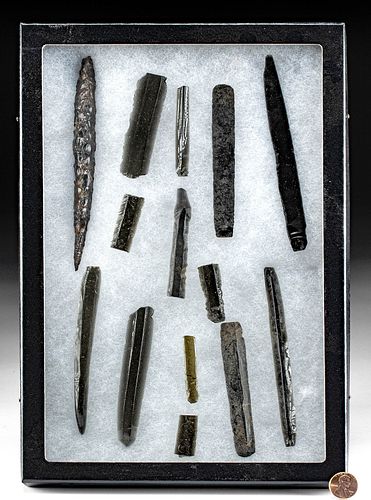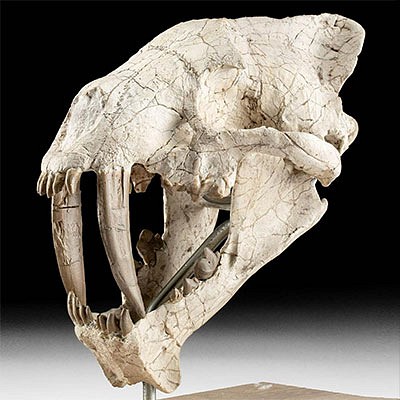14 Colima Obsidian Blades & Spear Head
Lot 43
About Seller
Artemis Fine Arts
686 S Taylor Ave, Ste 106
Louisville, CO 80027
United States
Selling antiquities, ancient and ethnographic art online since 1993, Artemis Gallery specializes in Classical Antiquities (Egyptian, Greek, Roman, Near Eastern), Asian, Pre-Columbian, African / Tribal / Oceanographic art. Our extensive inventory includes pottery, stone, metal, wood, glass and textil...Read more
Estimate:
$400 - $600
Absentee vs Live bid
Two ways to bid:
- Leave a max absentee bid and the platform will bid on your behalf up to your maximum bid during the live auction.
- Bid live during the auction and your bids will be submitted real-time to the auctioneer.
Bid Increments
| Price | Bid Increment |
|---|---|
| $0 | $25 |
| $300 | $50 |
| $1,000 | $100 |
| $2,000 | $250 |
| $5,000 | $500 |
| $10,000 | $1,000 |
| $20,000 | $2,500 |
| $50,000 | $5,000 |
| $100,000 | $10,000 |
| $200,000 | $20,000 |
About Auction
By Artemis Fine Arts
Jul 13, 2021
Set Reminder
2021-07-13 12:00:00
2021-07-13 12:00:00
America/New_York
Bidsquare
Bidsquare : Fauna, Flora, Stones & Bones
https://www.bidsquare.com/auctions/artemis-gallery/fauna-flora-stones-bones-7214
Join us for a very special summer auction featuring fabulous fossils, rocks, and minerals, plus art depicting flora and fauna from antiquity to present day. This is one you won't want to miss! Artemis Fine Arts info@artemisgallery.com
Join us for a very special summer auction featuring fabulous fossils, rocks, and minerals, plus art depicting flora and fauna from antiquity to present day. This is one you won't want to miss! Artemis Fine Arts info@artemisgallery.com
- Lot Description
Pre-Columbian, West Mexico, Colima, ca. 300 BCE to 300 CE. A collection of 14 obsidian blades each hand knapped for use as cutting tools. All pieces, except for the largest, are probably formed by flaking fragments from a cone shaped obsidian core. These blades are relatively flat with thin, razor sharp edges. In a world without metal, this sharp quality was especially important for ceremonies of ritual bloodletting and human sacrifice. The largest obsidian tool in the group is probably formed by flaking smaller fragments from a raw obsidian stone to create the slightly tapered butt end and tapered frontal point. The blade may have been used as a spear head and secured to the end of a lengthy wooden pole with leather or textile strips. All are displayed in modern Riker case. Size of largest blade: 5.75" L x 0.5" W (14.6 cm x 1.3 cm); case: 12.25" L x 8.25" W (31.1 cm x 21 cm)
Provenance: private Fayetteville, Arkansas, USA collection; ex-Dr. David Harner collection, Springdale, Arkansas, USA, acquired between the 1950s and 1960s
All items legal to buy/sell under U.S. Statute covering cultural patrimony Code 2600, CHAPTER 14, and are guaranteed to be as described or your money back.
A Certificate of Authenticity will accompany all winning bids.
PLEASE NOTE: Due to recent increases of shipments being seized by Australian & German customs (even for items with pre-UNESCO provenance), we will no longer ship most antiquities and ancient Chinese art to Australia & Germany. For categories of items that are acceptable to ship to Australia, please contact us directly or work with your local customs brokerage firm.
#162469Some are fragmentary. Chips and nicks to peripheries. Light mineral deposits. Good condition with Riker case.Condition
- Shipping Info
-
All shipping is handled in-house for your convenience. Your invoice from Artemis Gallery will include shipping calculation instructions. If in doubt, please inquire BEFORE bidding for estimated shipping costs for individual items.
-
- Buyer's Premium



 EUR
EUR CAD
CAD AUD
AUD GBP
GBP MXN
MXN HKD
HKD CNY
CNY MYR
MYR SEK
SEK SGD
SGD CHF
CHF THB
THB












